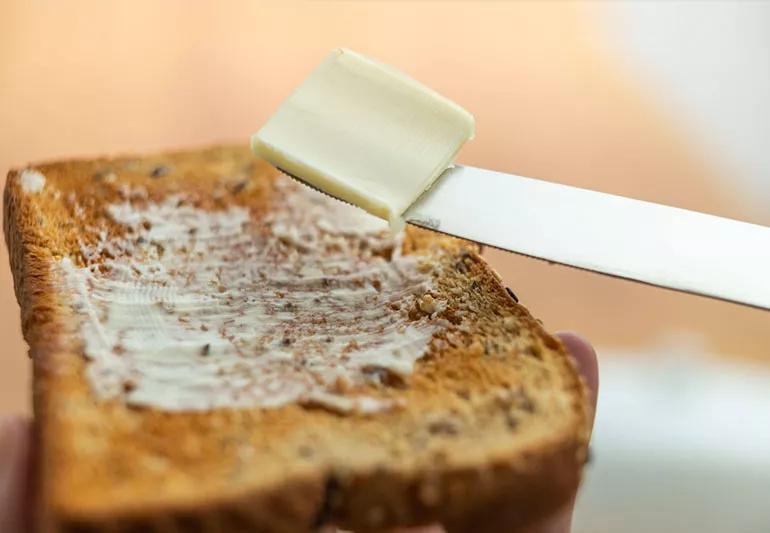The creamy cooking ingredient is delicious but not without its risks

Image content: This image is available to view online.
View image online (https://assets.clevelandclinic.org/transform/946c1524-e616-4232-a099-004fc6e3157f/cholesterolButter-LMC-061720-770x533-1_jpg)
Butter on Toast
Butter can be a rich, creamy delight, added to a hot piece of bread or used to cook some of our favorite foods. But it’s also known for not being very healthy, high in calories and fats.
Advertisement
Cleveland Clinic is a non-profit academic medical center. Advertising on our site helps support our mission. We do not endorse non-Cleveland Clinic products or services. Policy
Cardiologist Dennis Bruemmer, MD, PhD, talks to us about why butter isn’t very healthy for you, alternatives to avoid, and alternatives to embrace.
Like bacon and beef, butter is an animal product which, according to Dr. Bruemmer, means it’s probably high in cholesterol. “It’s about as fatty as you can get,” he says.
“It’s high in cholesterol and high in calories,” he adds, “and if you’re using so much, a quarter of a pound or a half a pound, to cook during the day and bake during the day, it just adds up. Butter contains high levels of saturated fat and that’s what drives up cholesterol.”
The issue with butter ties into larger issues with food consumption in the United States, Dr. Bruemmer says. “Over the past few decades, our patterns have changed here so that now 60% of our diets are ultra-processed food.”
“Processed food, you can still see that it’s food,” he continues. “Take a pickle, for example. It’s a cucumber that’s been processed, but you can still see it was food. With ultra-processed foods, like a donut or pizza, you can’t tell where the food came from.”
The consumption of ultra-processed food not only makes people gain weight and even eat more. And butter is often a processed ingredient that’s added to those ultra-processed foods, heaping its saturated fats on top of everything else.
Advertisement
Dr. Bruemmer says that occasionally using a little amount of butter to cook food in, in moderation, isn’t necessarily bad. It’s just that we tend to use so much butter, that health problems can develop.
While you’ll want to avoid margarine, as it can still contain high levels of trans fat and saturated fat, a better alternative he suggests is vegetable oil which cuts out the saturated fats contained in butter.
Dr. Bruemmer also stresses the success of the Mediterranean Diet. “It’s the only diet in trials that in control studies has shown to improve health and lower the risk of heart attacks. It’s high in fruits and vegetables, adds some fish and lean white meats with grains, but it’s low in dairy products and red meat.”
And if you’re looking for something to spread on your bread, he points out that olive oil and a tomato spread, part of the Mediterranean diet, is popular in the Catalan region of Spain. “It’s not high in saturated fats content,” he says.
Advertisement

Sign up for our Health Essentials emails for expert guidance on nutrition, fitness, sleep, skin care and more.
Learn more about our editorial process.
Advertisement
Health officials say that consuming unpasteurized milk increases potential exposure to harmful bacteria
There’s definite nutritional value in chocolate milk, but the added sugar and calories can be a concern
Medications, dietary changes, abdominal massage and physical activity can all help you start to feel better
Experiment with numerous dairy alternatives or try taking a lactase enzyme medication before you eat dairy
Lactose is difficult to breakdown and digest because of its complexity
Be sure to check the labels of common foods like canned tuna, bread, hot dogs and chocolate
This dairy product can help you lose weight, manage blood sugar and strengthen bones
Rich in calcium and protein, milk has 18 of 22 essential nutrients that your body needs
Prioritize your health by managing stress, strengthening your social connections and getting quality sleep
Bolsters, blankets, pillows and blocks can offer extra support, stability and comfort
Allergies, postnasal drip, asthma or reflux could be to blame for a cough that won’t quit